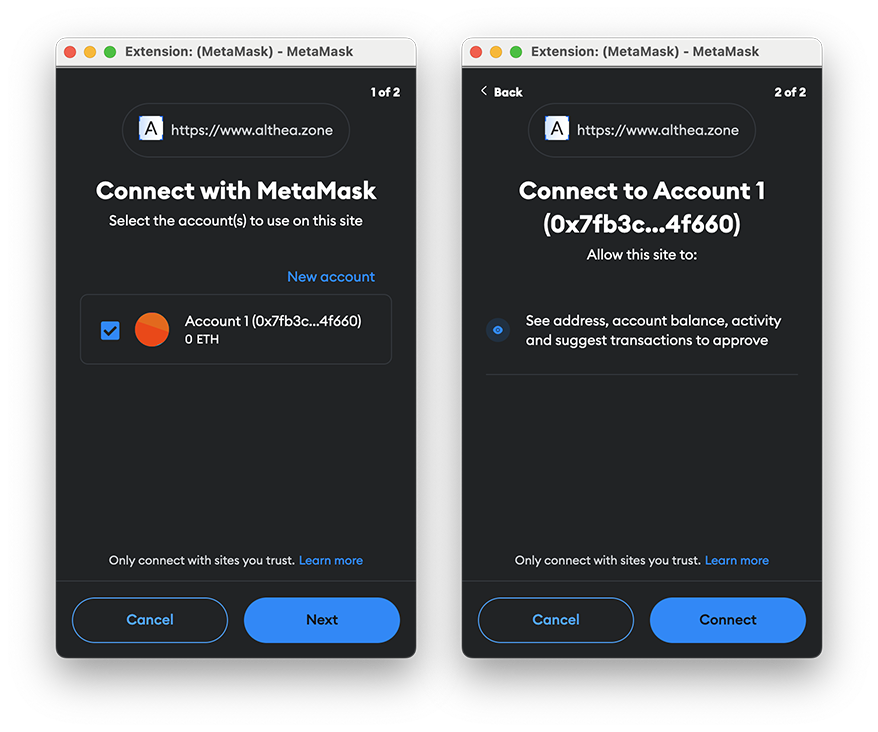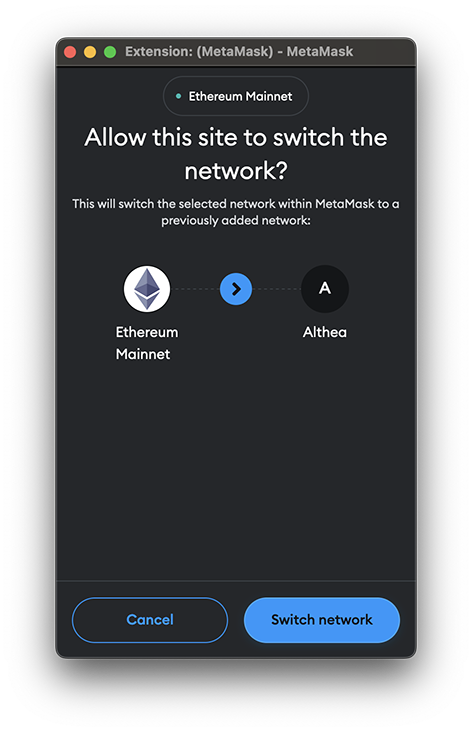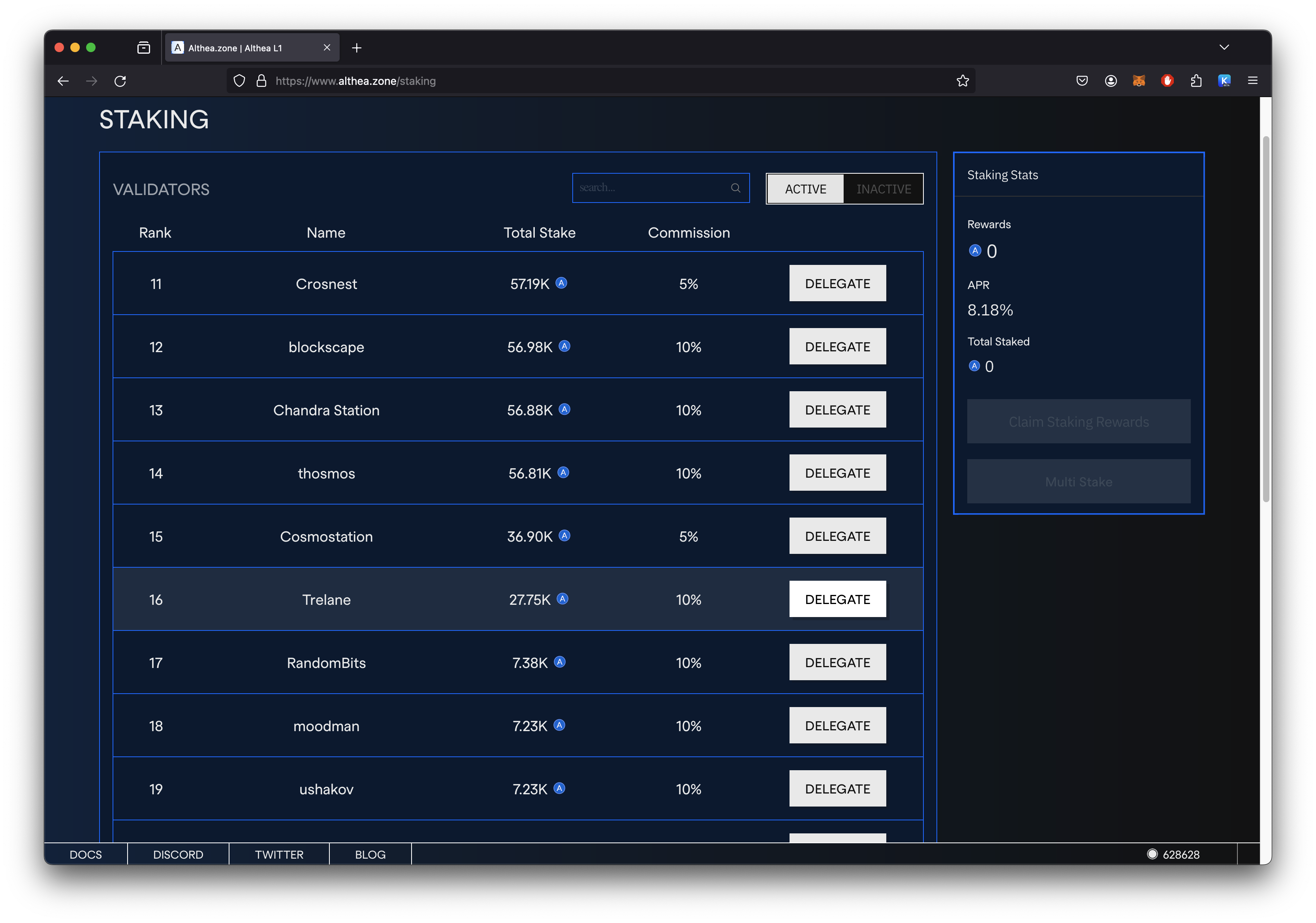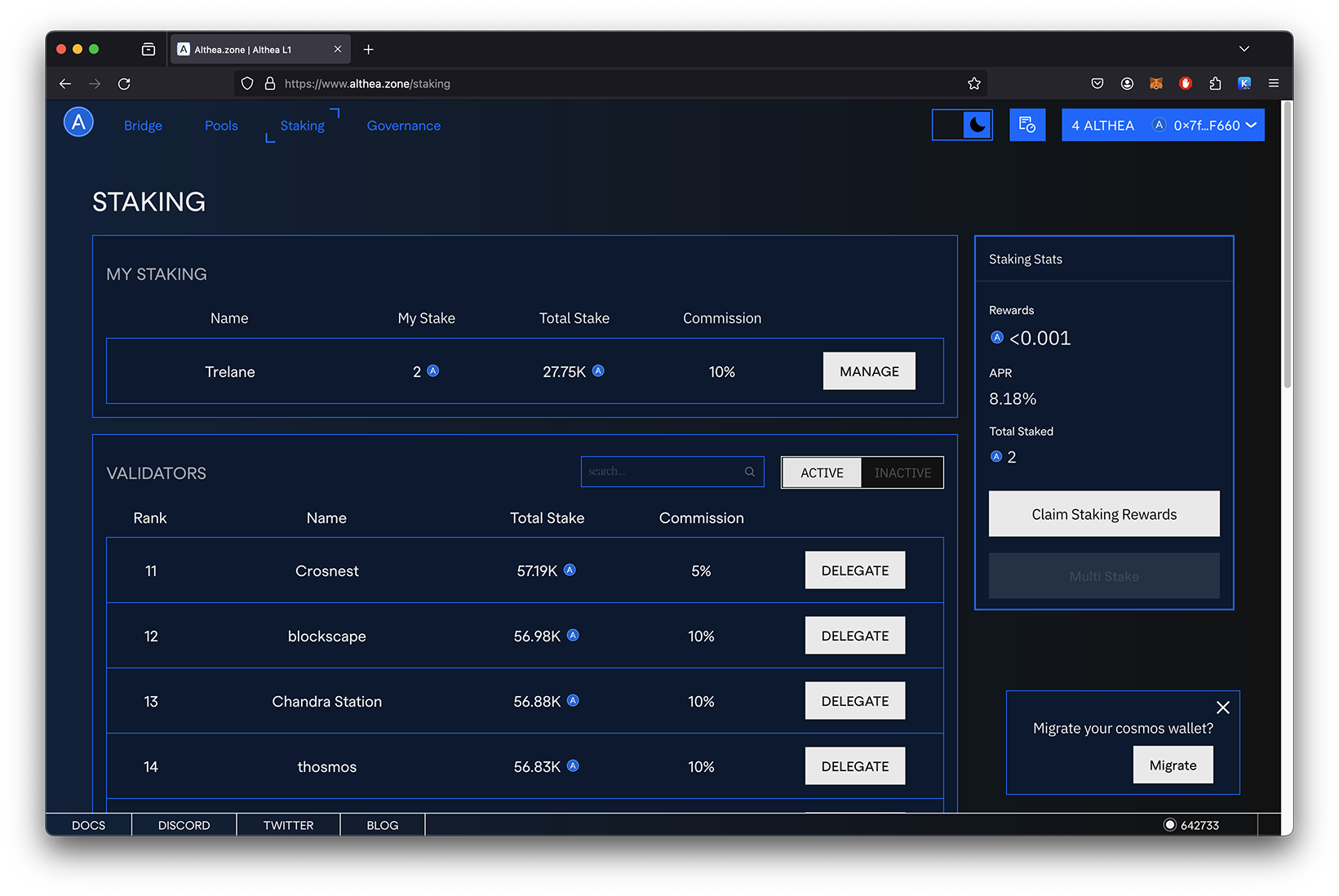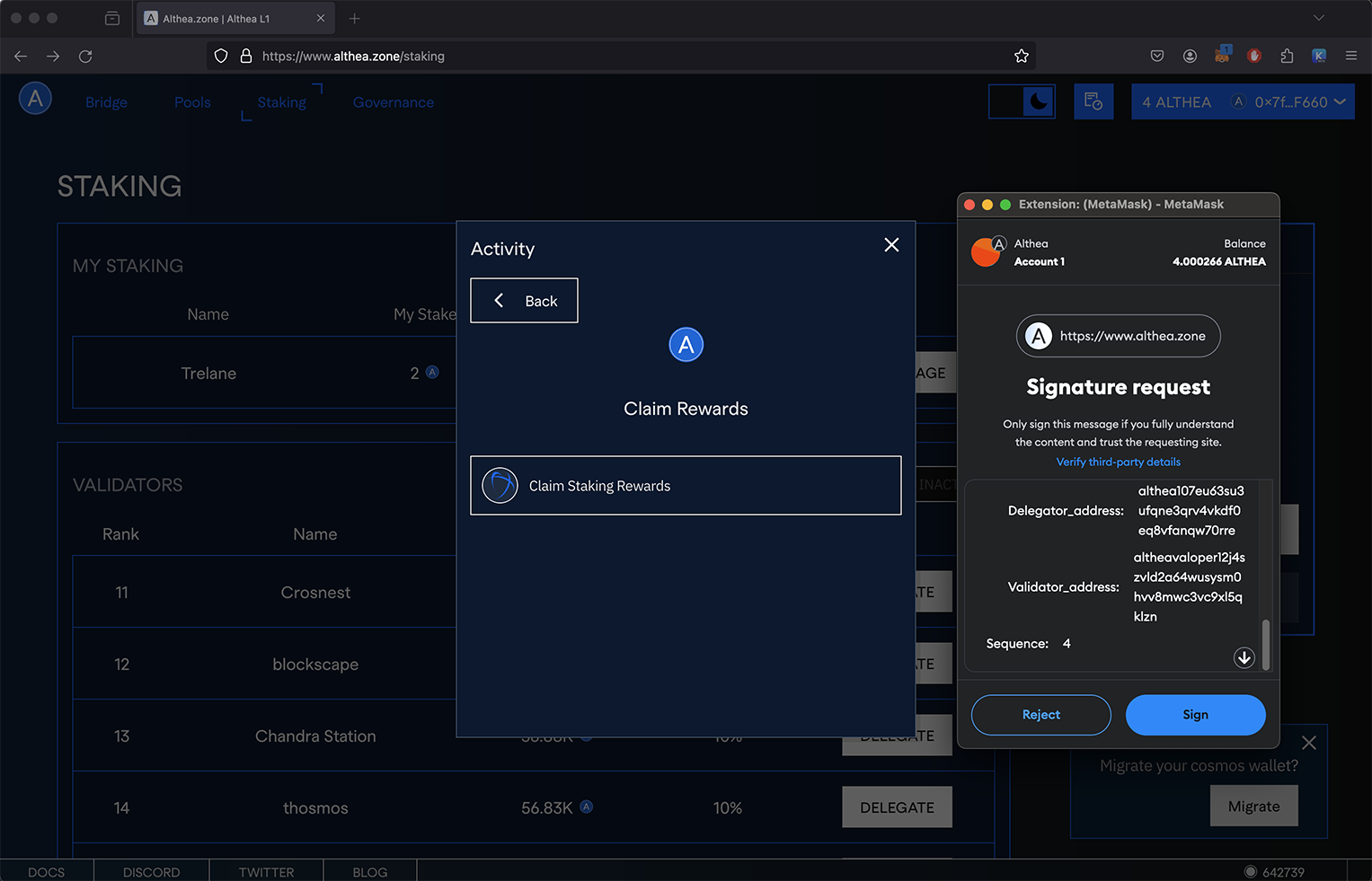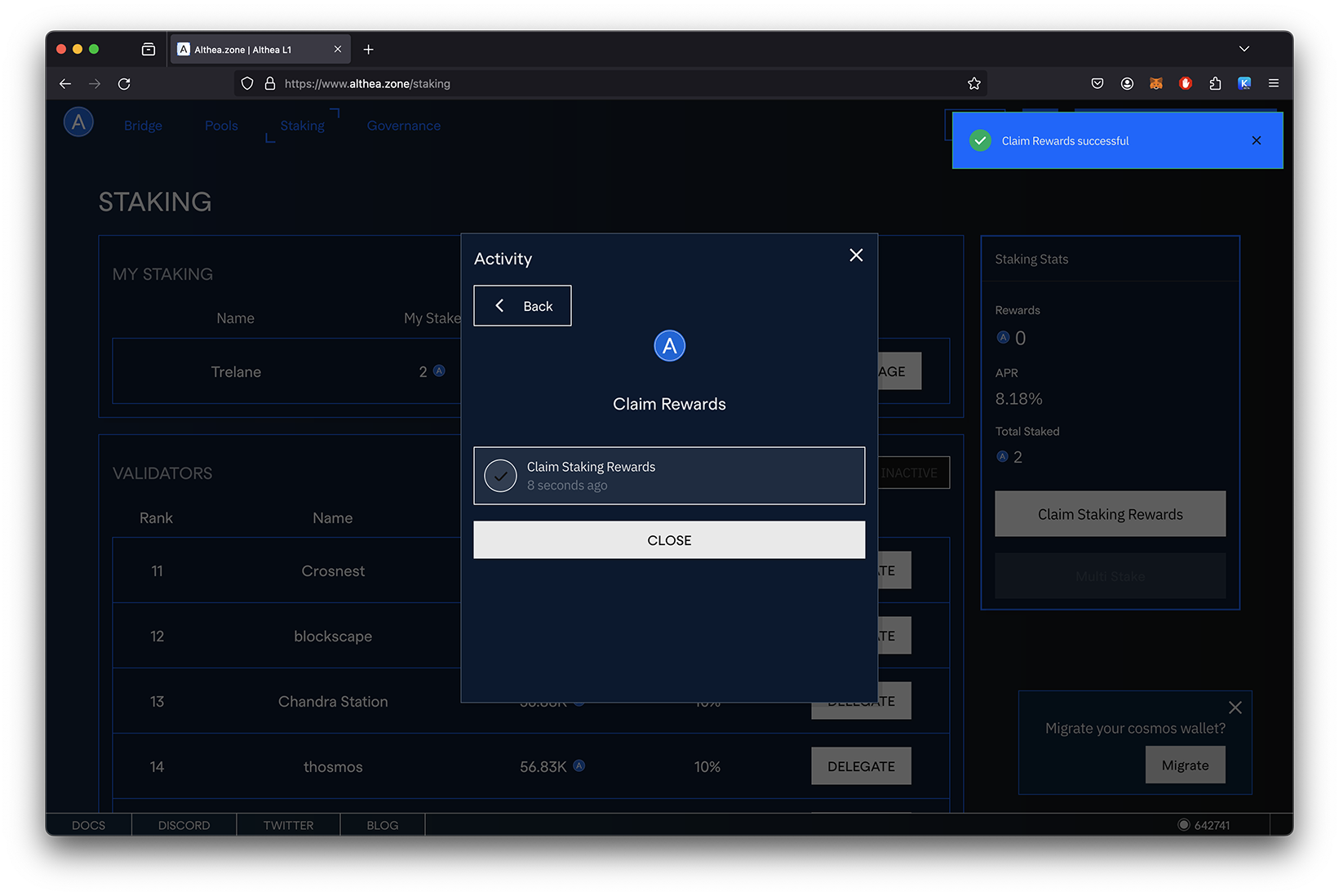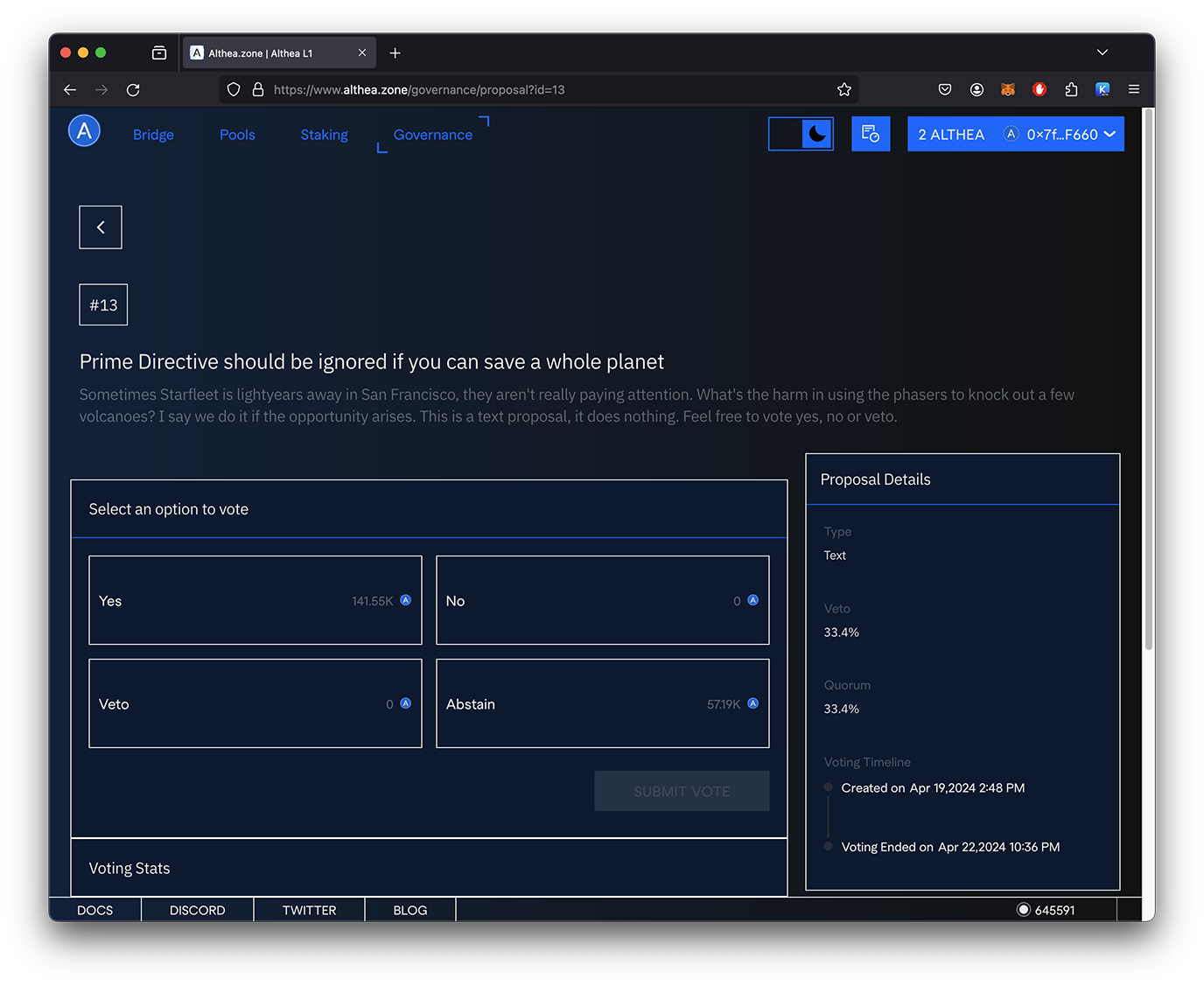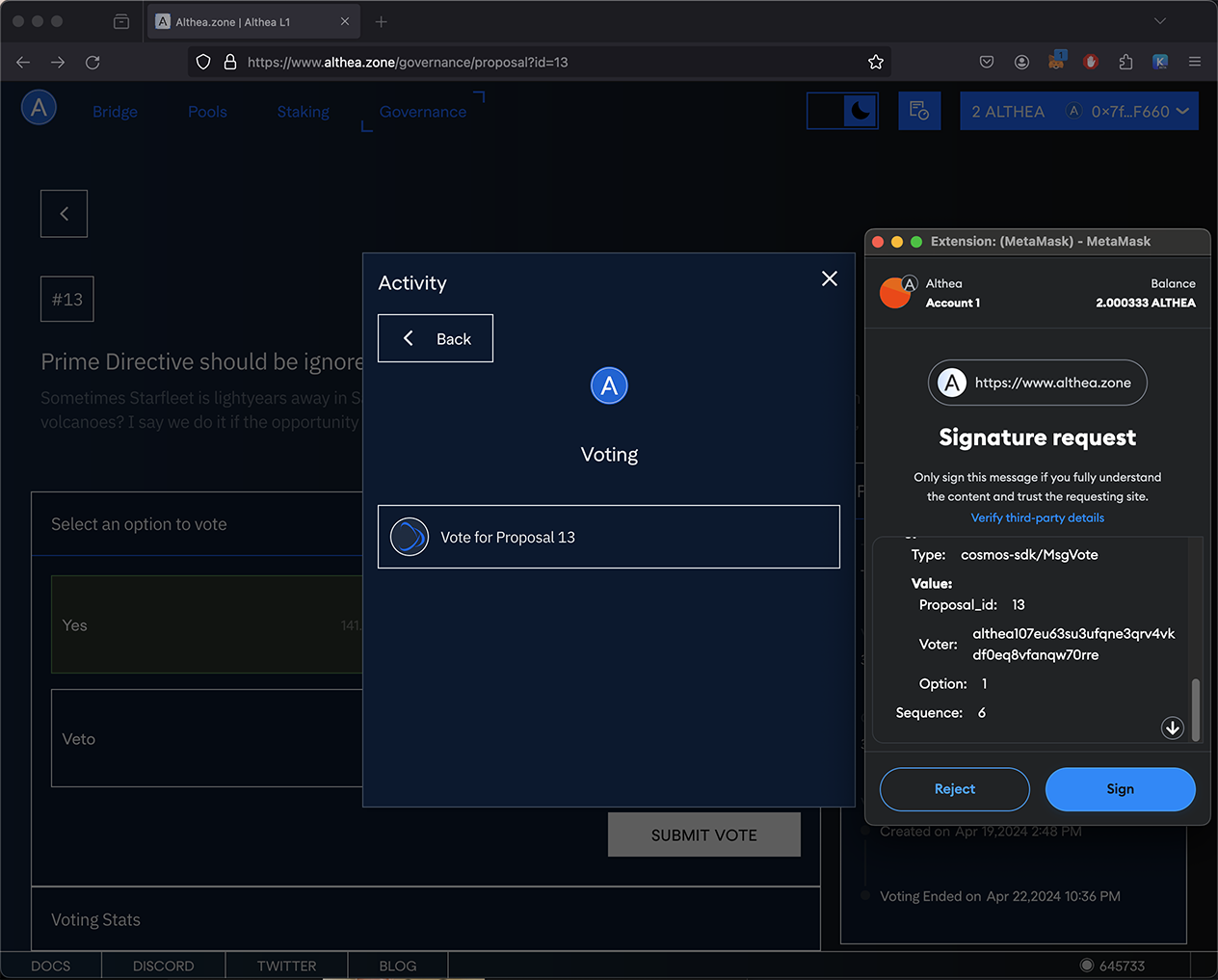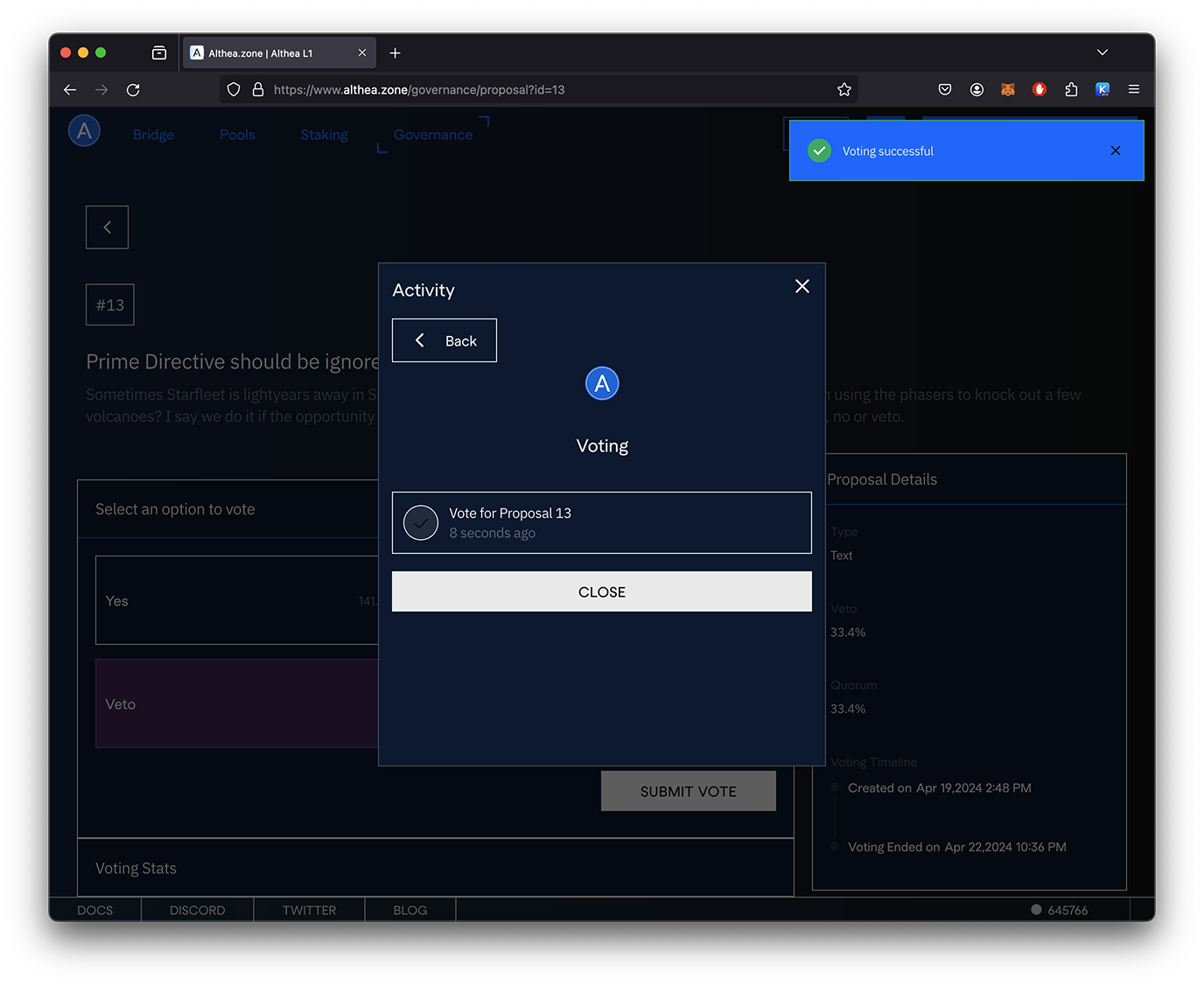Quick Links
- A brief note on Althea L1 wallets and wallet managers
- Creating a new Althea wallet
- Acquiring $ALTHEA
- Tips for Staking Althea
- Staking $ALTHEA
- Claiming Staking Rewards
- Managing your delegations (unbonding/redelegating)
- Unbonding/unstaking
- Redelegating
- Voting
Pro Tip: You can right-click on the images in this document and select “open in new window” to view relevant video tutorials.
About Althea wallets and wallet managers
Althea L1 is a Cosmos-EVM-compatible chain and thus has two kinds of wallets (i.e. wallet addresses).
Generally speaking, most people interacting with the Althea L1 blockchain will use an EVM-compatible wallet and an EVM wallet manager such as Metamask. There are however some people who have Althea addresses that are Cosmos addresses (non-EVM).
If you have a Cosmos Althea address
For those starting out with a non-EVM/Cosmos Althea L1 wallet, you can use Keplr just as you normally would with any other typical Cosmos chain.
If you have an EVM Althea address
Metamask is the recommended wallet manager. However, due to Metamask limitation, you will need to start fresh/from scratch. As of this writing, Metamask will not allow you to import your mnemonic after you are already using MM to manage an existing wallet without use of the command line.*
An easy solution is to create a new Chrome profile and install a new instance of Metamask for that profile. You can then simply import your Althea wallet using your mnemonic.
For the curious: Keplr can detect and display the correct balance of an Althea EVM wallet if you use your mnemonic to import your wallet, but it won’t be able to interact with other sites (such as althea.link, so it is best to stick to Metamask to avoid confusion.
The exception to the rule: It is possible to export a private ETH key using the commandline interface (CLI). For more on this, please see Althea L1 CLI usage.
Althea L1 Blockchain Basics
Creating a new Althea Wallet
If you are starting fresh, there are two steps necessary before you begin. Firstly, installing a wallet manager (MetaMask) and secondly creating your new Althea wallet.
Installing MetaMask Wallet
Althea L1 is an EVM compatible blockchain and MetaMask is the recommended wallet. If you have not already, you will first need to install MetaMask.
To do so, first visit the official MetaMask website and select the appropriate version for your browser or mobile device.
Adding Althea L1 to MetaMask
Once you have installed MetaMask, visit https://althea.link
Note: The migration tool has been deprecated. To migrate tokens from your Cosmos wallet manager (Keplr/Leap) to your Althea EVM wallet (Metamask/Rabby), see the token migration doc.
At the top right corner of the page, click the “connect wallet” button. 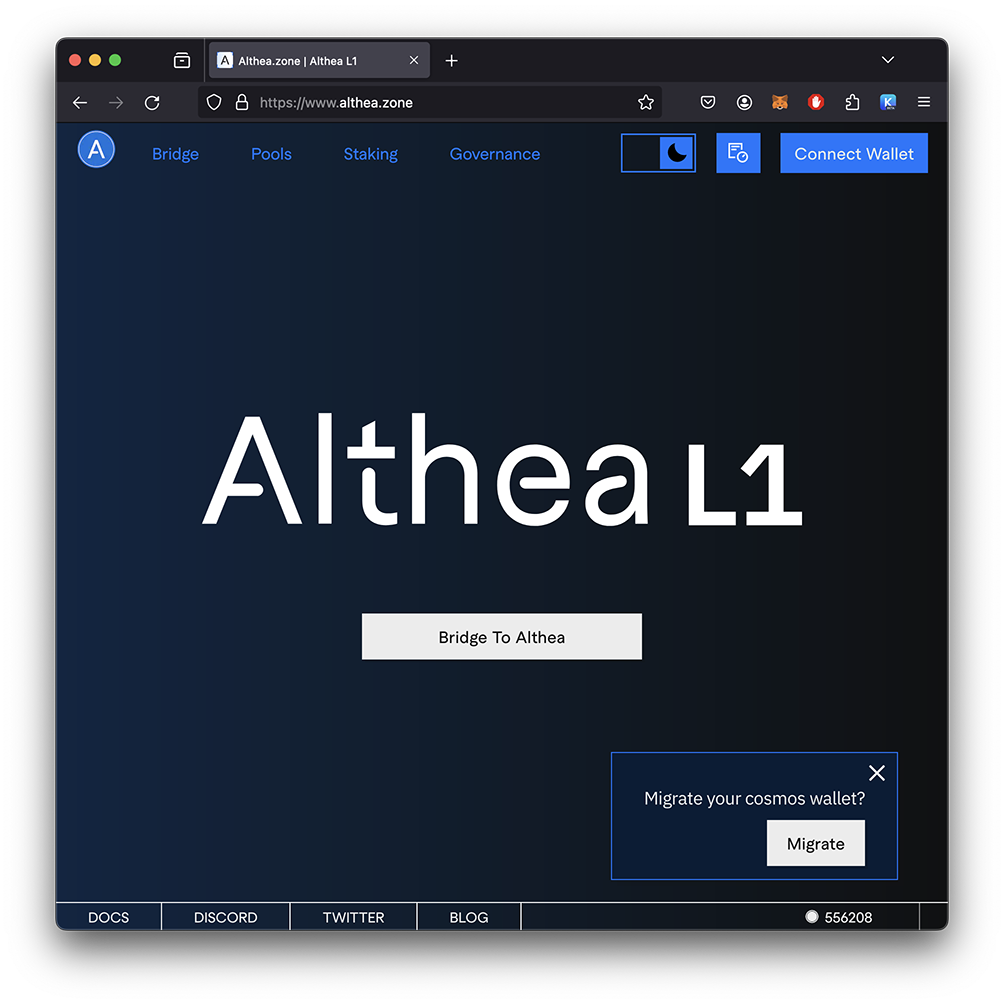
Select MetaMask from the wallets listed.
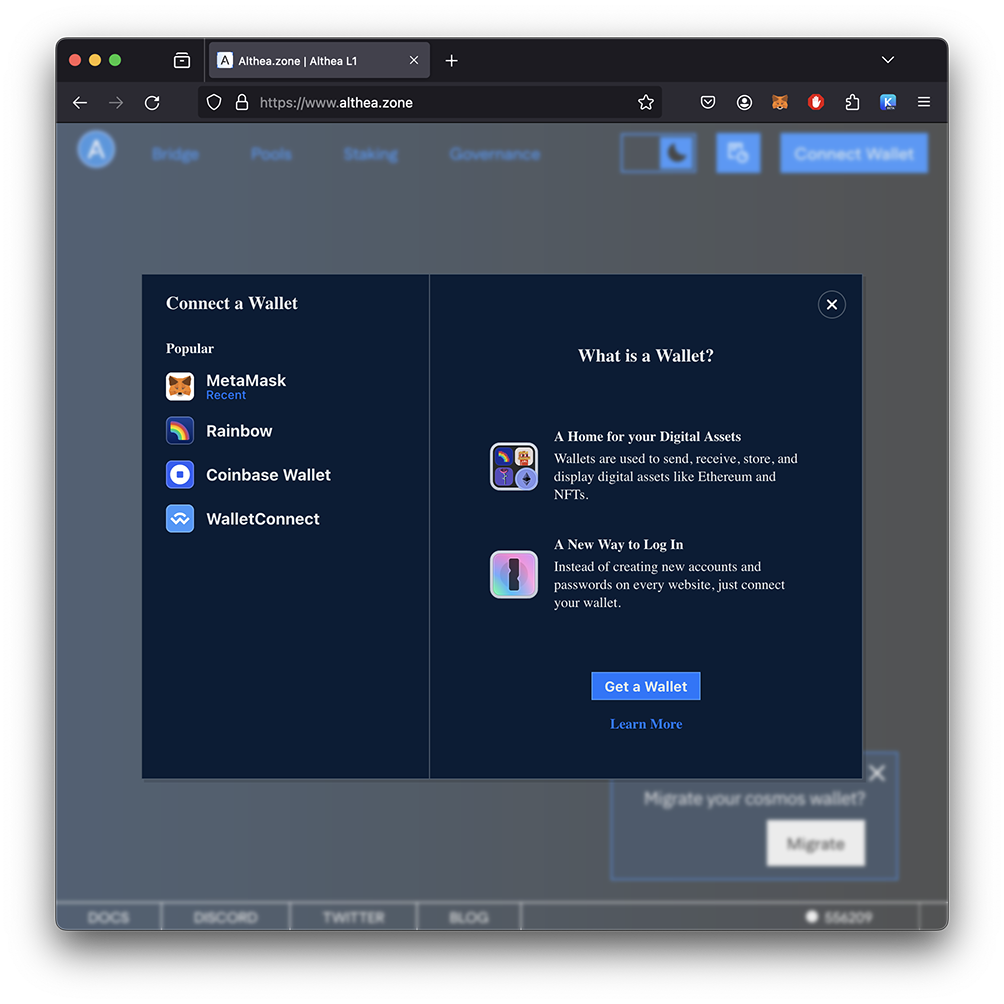 Your MetaMask wallet will pop up and ask if you wish to connect your wallet to althea.link. Click the next button.
Your MetaMask wallet will pop up and ask if you wish to connect your wallet to althea.link. Click the next button.
It will then ask you to give Althea.link permission to interact with your wallet. Click the connect button.
Now Althea.link will add the Althea L1 Network to your wallet. You will need to scroll down and click approve. 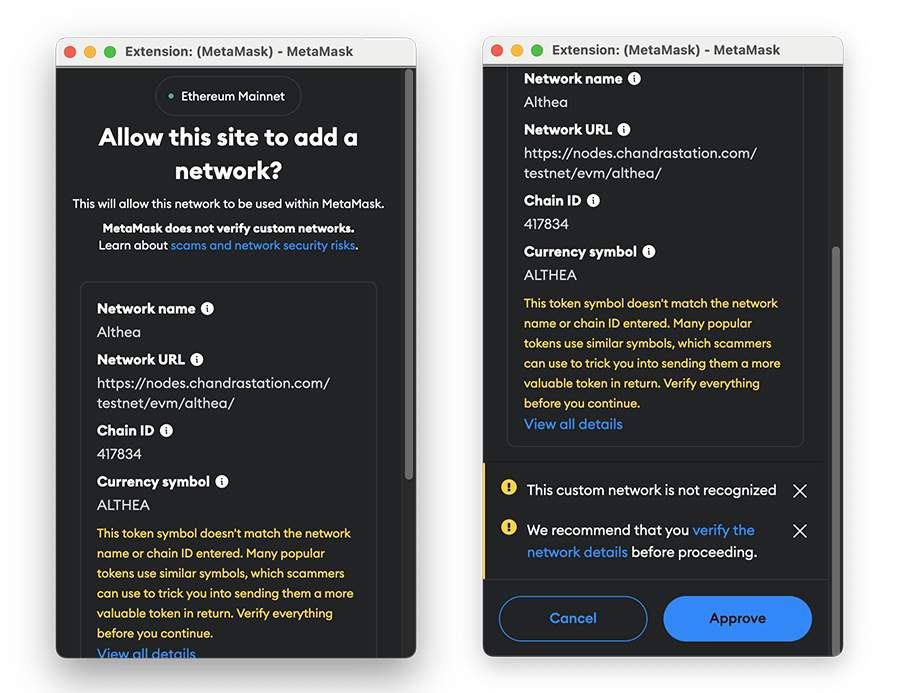
Finally, MetaMask will ask if althea.link can switch to the Althea L1 Network. Click switch network.
Acquiring $ALTHEA Tokens
The $ALTHEA token is currently available on the following centralized exchanges:
You can also use the Althea L1 iFi DEX to acquire $ALTHEA.
Tips for Staking $ALTHEA
When selecting a validator with whom to stake your $ALTHEA, it is worth keeping three factors in mind: Decentralization, reputation and commission.
Decentralization
The Althea UI automatically filters out the top-10 validators, according to voting weight. This is to encourage an even spread of token delegations across the validator set, benefiting both validators and the health of the chain. Nevertheless, you are encouraged to consider staking with a validator that is not at the very top of the validator set, or diversifying your delegation across multiple validators.
Reputation
When selecting a validator prioritizing decentralization is key to ensuring network security and resilience. Look for validators with a track record of reliability, transparency, and active participation in governance. Consider their infrastructure robustness, geographic distribution, and commitment to promoting a diverse validator set. Diversifying your stake among multiple validators helps mitigate risks and contributes to a healthier and more decentralized network. Stay informed about validator performance, community feedback, and network upgrades to make informed decisions that align with the long-term goals of the Cosmos ecosystem.
It is important to note that when governance proposals are live, the validator with whom you have staked your $ALTHEA will cast a vote using your delegation power.
If you’d like more about the individuals and teams behind the validators in the active set, you are encouraged to visit the validator promotion category of the Althea Forum. This is where validators will make introductions and provide background on their services and track record. You can also make direct inquiries in the #validator-promotion channel of the Althea Discord Server.
Commission
Each validator sets their own commission rate, which represents the percentage of the staking rewards that are paid to the validator as they accrue. For example, if a validator has a commission rate of 10% and your stake has accrued 1 $ALTHEA in staking rewards, when you withdraw the rewards you will receive 0.9 $ALTHEA and the validator will receive 0.1 $ALTHEA. This commission incentivizes validators to maintain the infrastructure needed to validate for the chain. When selecting a validator, the commission rate is something to consider.
That said, validators are discouraged from setting extremely low (or zero) commission rates in an attempt to draw delegations, as this practice promotes centralization of token delegations. This scheme is typically meant to grow their delegations rapidly, only to raise the commission rate later. For this reason, we would encourage you to avoid delegating to validators with an extremely low commission.
How to Stake Althea
To stake your $ALTHEA, earn rewards, and support the Althea L1 blockchain, first visit Althea.link.
1) Select the staking tab at the top of the page. If you have not already, connect your wallet by clicking the connect wallet button and approve the request in MetaMask.
2) After examining the validator you would like to delegate to, click the delegate button.
3) As in the video above, enter the amount of $ALTHEA tokens you wish to delegate, click delegate, and sign the transaction.
Claim Staking Rewards
After your delegation has accrued staking rewards, you can collect using the staking section of althea.link.
- Navigate to althea.link
- Connect your wallet
- Select “Staking”
- On the right, click the “claim staking rewards” button
- Sign the transaction via MetaMask
A “Claim Rewards successful” message will appear in the upper right when the transaction is completed. You will now note that the pending rewards balance has decreased, and your wallet balance has increased relative to the amount of staking rewards claimed.
Manage your delegations (unbonding/redelegating)
Staked tokens are bonded, meaning they are not liquid and cannot be transferred. If you unbond your tokens, you must wait until the unbonding period has elapsed. The unbonding period is a parameter set by governance, which is currently 21 days.
Unbonding
To unbond your delegation, connect your wallet to althea.link, navigate to the staking page, and click on the manage button.
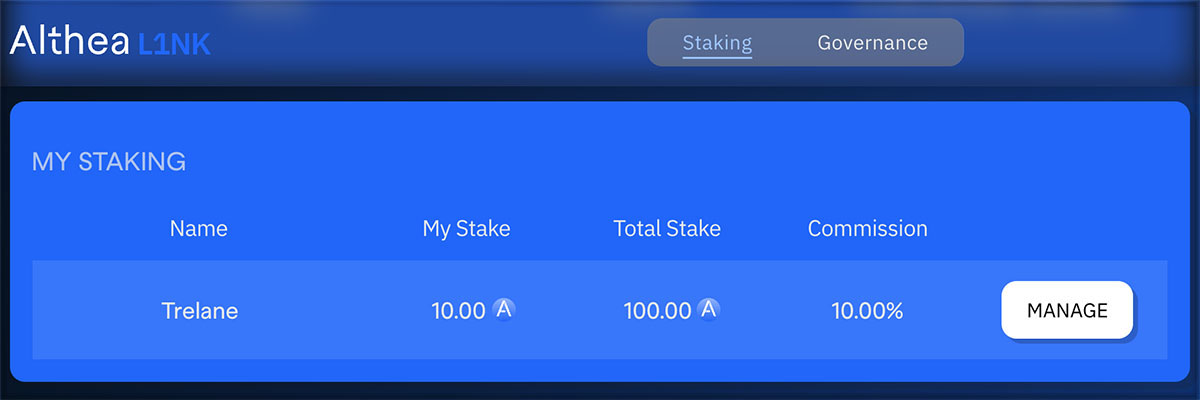
Click on “undelegate” to select it, and enter the number of ALTHEA that you wish to undelegate.
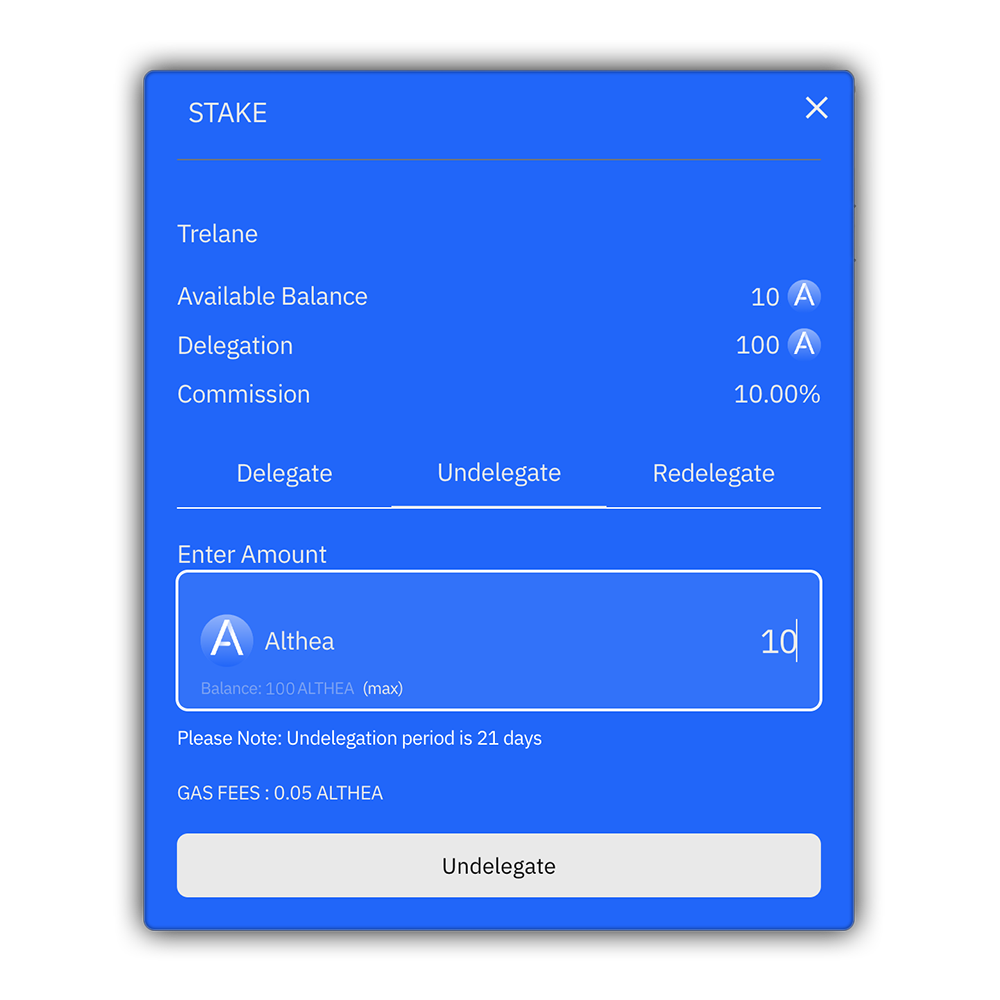
In Metamask, scroll to the bottom of the window in order to activate the APPROVE button and approve the transaction. When the unbonding period (21 days) has elapsed, the tokens will be available in your wallet.
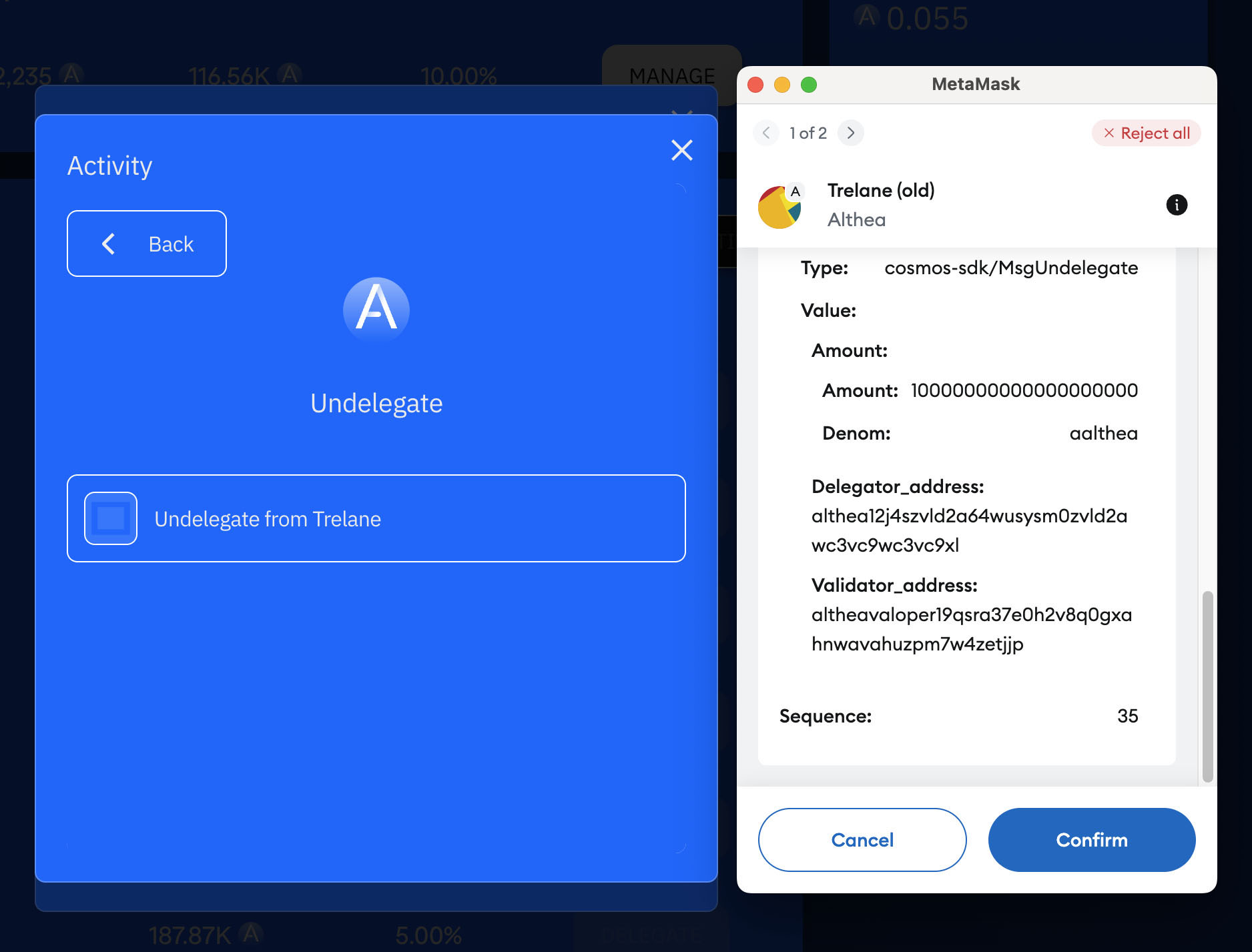
Redelegating
To redelegate your staked ALTHEA to another validator, connect your wallet to althea.link, navigate to the staking page, and click on the manage button.

Click on “redelegate” to select this action and then use the drop down menu to select new validator that you will wish to move your delegation to.
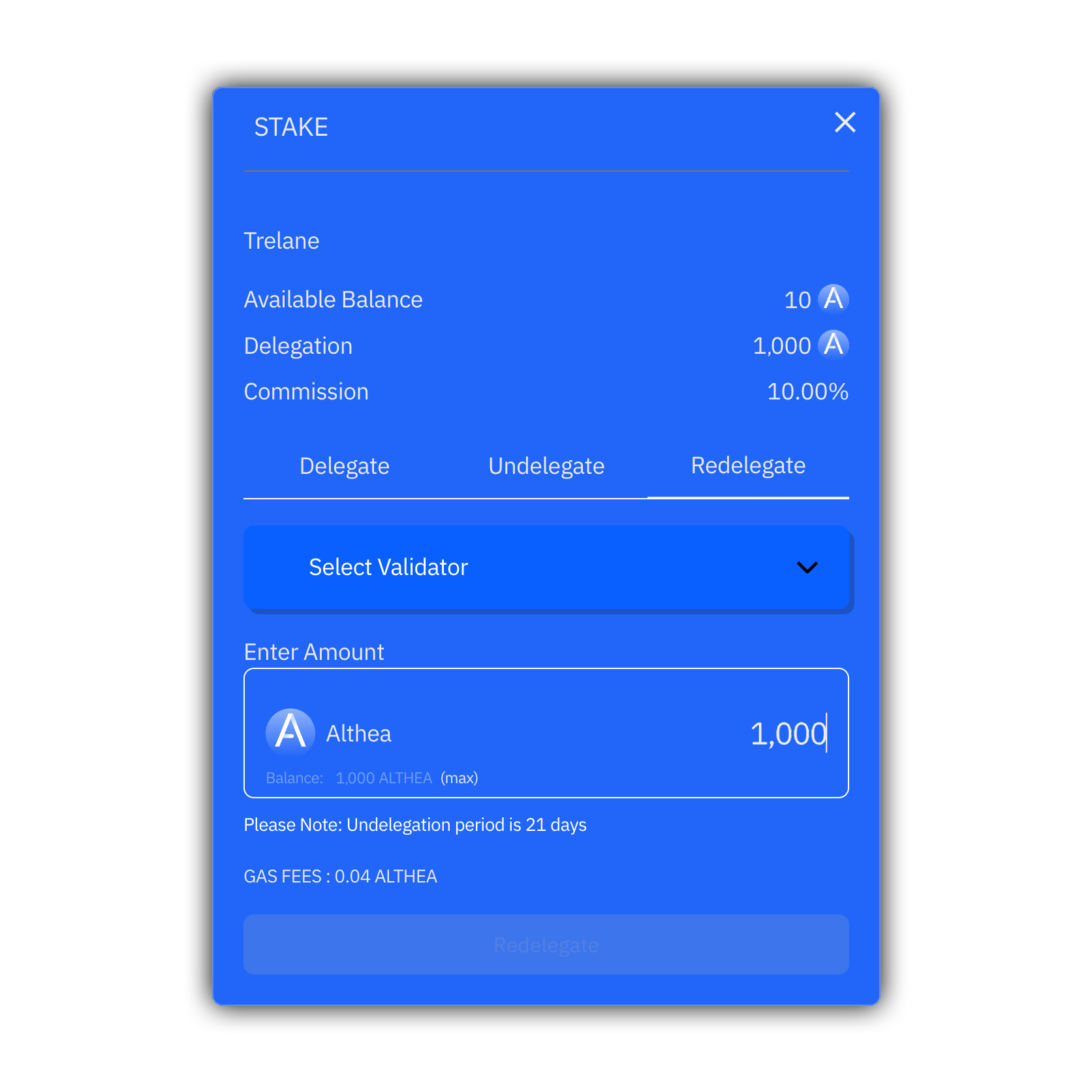
In Metamask, scroll to the bottom of the window in order to activate the APPROVE button and approve the transaction.
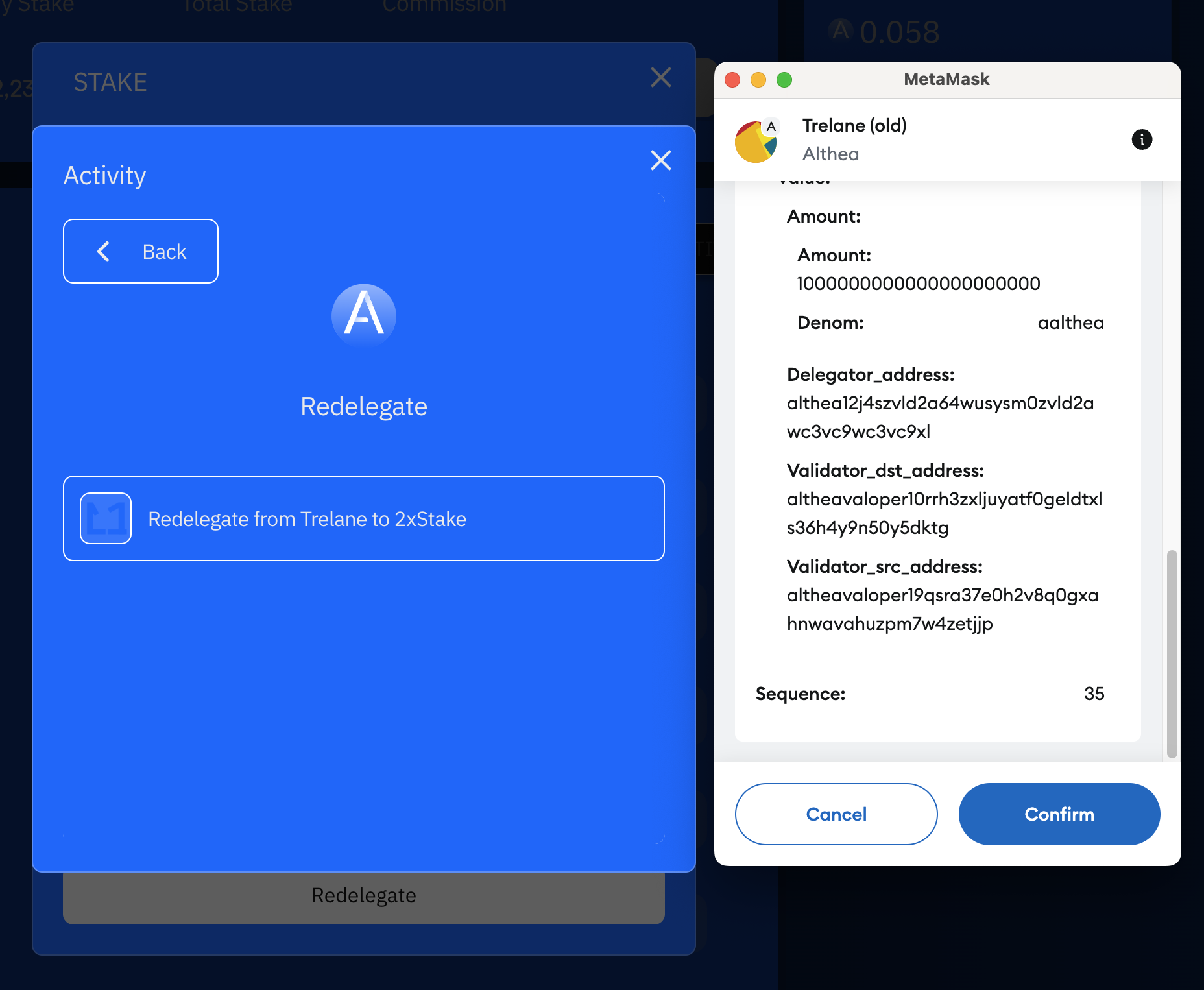
Note that after you have redelegated tokens to a new validator, you will not be able to redelegate them again until one unbonding period (i.e. 21 days) has elapsed.
Voting
For a more detailed look at community governance and voting dynamics, you are encouraged to read the documentation on Althea L1 Network Governance. This section will only cover voting with MetaMask or from the command line.
Voting with MetaMask
First navigate to the governance section of Althea.link and confirm that your wallet is connected before proceeding.
1) Click on any active proposal that you wish to vote on 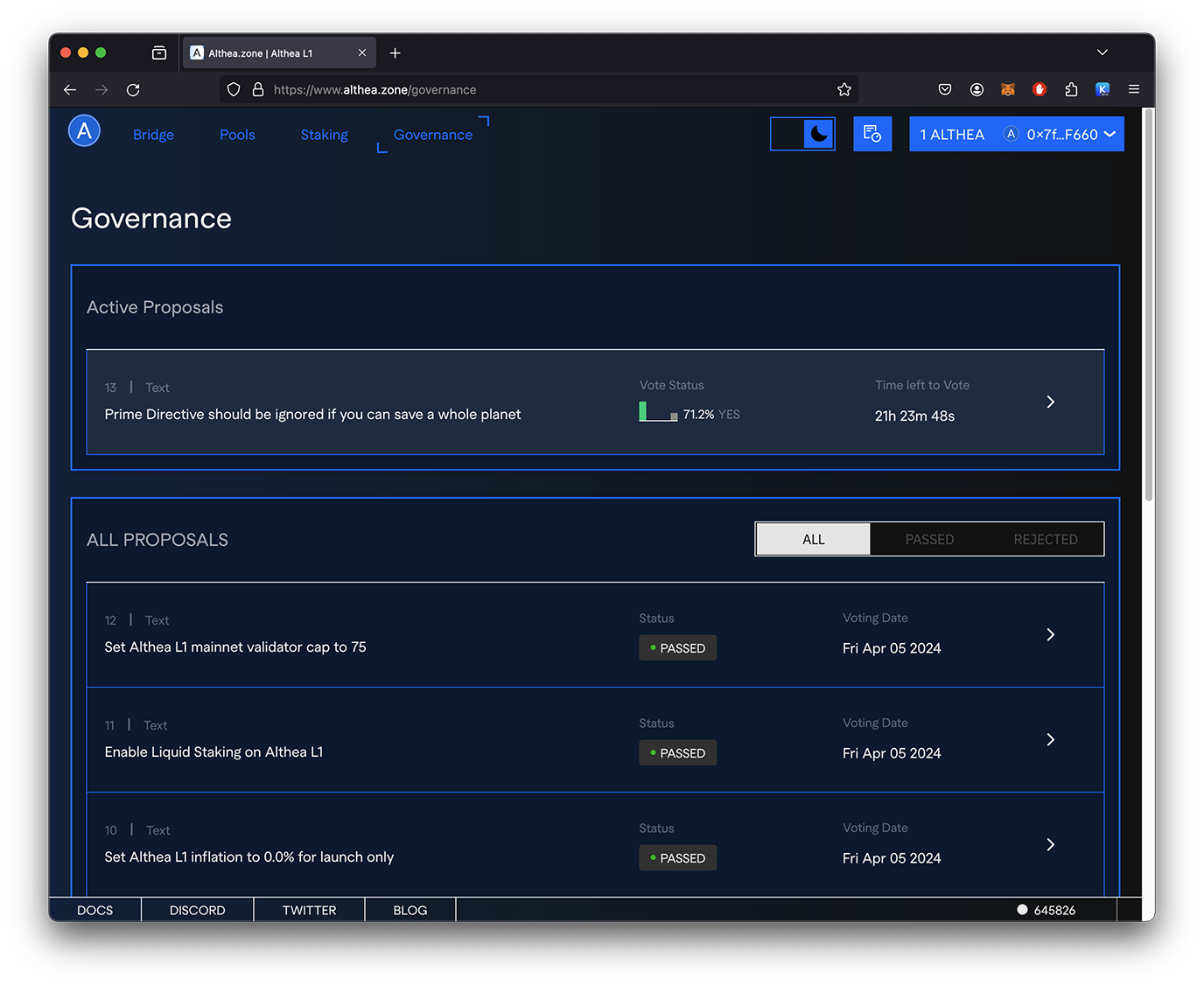
2) Select Yes, No, Abstain, or Veto
3) Sign the Transaction with MetaMask
